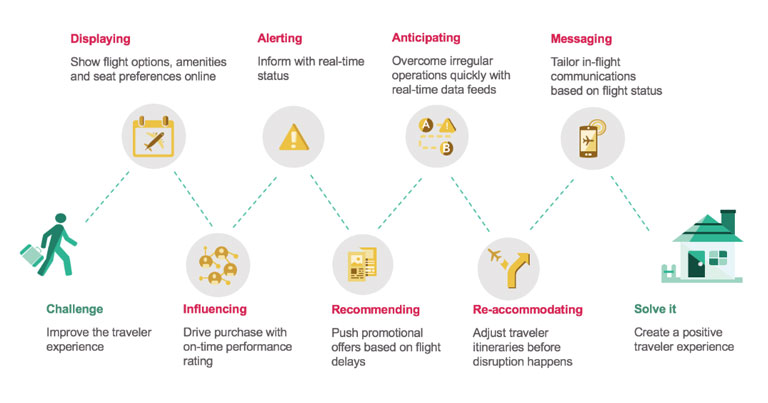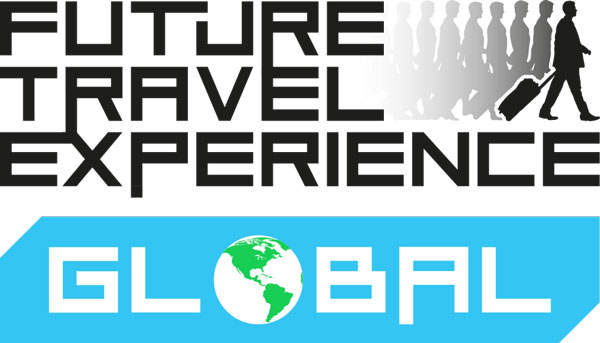
You may well have heard that the world’s most valuable resource is no longer oil – it’s data. Indeed, utilising data can have a transformative impact on business performance, passenger experience and revenue growth in aviation and the wider transport industry. Cirium’s Carrie Mamantov, Marketing Director, and Steve Lappenbusch, Principal Product Manager, share insight into how airlines and airports can make best use of data to deliver wide-reaching benefits.
FTE: At FTE Global 2019 Cirium will be leading a co-creation session exploring “How can the industry better utilise data to exceed traveller expectations?” So, just how big a role can data play in improving the overall customer experience?
Carrie Mamantov: This is definitely a massive role – and not in just the obvious ways like during the trip itself. The data links us to the passenger and helps us get to know them as a consumer.
The most powerful use of data for this industry is in finding new markets and revenue by understanding consumer behaviour the way many other industries already do. This means both analysing people individually, with proven scores and marketing attributes, and as groups, such as through consumer segmentation, in order to better understand what kinds of travel purchases different people will buy, how often, and when. Having the data just tells half the story though; it also takes seasoned expertise to transform that data into interlocking networks to interpret consumer behaviour to identify new markets and revenue streams.
Exceeding travellers’ expectations means treating them as a whole person, a full consumer, to better predict buying preference and power. This turns travel data analytics into a strategic differentiation for those who are using it.
To what extent do you feel the industry is already making best use of data to deliver improvements across the board? How much room for improvement is there?
Carrie Mamantov: We have been helping airlines and airports track their arrival and departure performance for more than ten years. The industry is pretty savvy in how they incorporate historical trending into their operations and route planning. The room for improvement is in how they shift from static monthly updates and reports to real-time analytics. We are seeing some customers take the answers they find in the data and dynamically improve their workflows. Some are building dashboards to monitor KPIs, others are triggering internal messages for operations. The teams who are putting the analytics into action will soon be building more resilient schedules and fine tuning their recovery operations. Airports and airlines should be excited at the possibilities. The most important improvements have to come from thinking about data differently. Right now, everything is thought of as a schedule, an itinerary, or as a single experience. As we link the data together and put it to action it will be clear where we can multiply the effect on the traveller experience.
“Digital transformation” is a term that we hear a lot in this industry. What does “digital transformation” mean for Cirium and what steps do you feel airports and airlines should take today to prepare for a digital future?
Steve Lappenbusch: The term “digital transformation” is really broad and very daunting for many companies. We have heard loud and clear it feels like things are out of control when you don’t have a handle on your data. We are focused on helping the industry shape an intelligent future with powerful data and analytics. Digitising a process does not matter if you cannot get value out of it, and while we are definitely here to help digitise the travel experience, we believe it starts with an ‘analytics evolution’.
To achieve competitive, constant analytics evolution, travel companies leading the way will manage a diverse portfolio of analytic partners each solving some part of their strategic needs.
Airlines and airports can start to pinpoint where they want analytics to add value. Some great questions to ask are:
- What profitable problem are you trying to solve?
- Can you articulate it so anyone can understand the problem, the solution and the value?
- Does solving it fit into your long-term technology roadmap?
- Is it much cheaper to buy it than build it and maintain it all yourself?
- Can you afford the in-house expertise to compete in that problem space globally?
- And, most importantly, do you really have the data you need to solve this problem and compete?

The stand-out performers in the Airport Performance Awards (sponsored by Cirium) will be announced during FTE Global. Please tell us more about these awards and the criteria you have used to judge airport performance?
Carrie Mamantov: This award is a start at recognising the industry for their performance toward the traveller experience. This is the first time to connect different parts of the airport business together, to measure the impact on the traveller.
We created a snapshot in time to compare the performance of two primary elements of the traveller’s experience. Using our monthly on-time arrival reports, we looked for the greatest change in both on-time departure and ASKs. Some really stand out performances appeared in comparing Q2 results from 2018 to 2019. All the finalists had impressive growth. In some cases, the comparison for that time range was very similar and we looked at all the on-time metrics we track to have the most thorough assessment. Air service development and marketing teams are always working hard to build a complete story of their value and potential opportunities. Including the operations, data brings more teams together. I would expect that these stand out airports collaborated to develop a strong plan last year that brought them to growing and maintaining a positive traveller experience at the same time.
At FTE Global 2019, there will be a big focus on new and emerging trends in the air transport industry. What are the key trends that you think will have the biggest impact on the industry during the next 3-5 years?
Steve Lappenbusch: The undeniable trend is moving past go-it-alone to managing a diverse and nimble portfolio of analytics. This means a few things:
- Consumer analytics driven by a need to discover new revenue – Airlines are increasingly making significant profits from ancillaries. Indeed, for some it is their main profit generator. This trend will continue past airlines into the rest of travel. But, to make this work, travel will need to fully embrace the idea that they are selling to a person, not a ticket holder, itinerary, booking or a shallow online profile. Consumer analytics will accelerate and drive market discovery and personalisation rapidly over the next five years.
- Intelligent machines/Smart tech – Anything that is able to operate based on trended data to anticipate behaviour, or even use machine learning to build up new insights is only going to grow in importance. It could be used to enhance the maintenance of aircraft fleets, the whole customer journey experience and help inform and drive efficiencies across the industry.
- Technology partnerships and opening up data sharing – Where organisations are starting to identify that shared value in building a solution together, we are going to see greater value to the traveller as well. The experience can be stronger when companies can focus on what they do best. If a premium service is your USP, then you want your teams to always have that as their first priority. The more they are distracted from that by being drawn into operational concerns, or new technologies, the more likely the customer experience is impacted as well. Other industries have moved toward a more open environment already and we can see how the transformation accelerates. That is starting with the CIO taking on a more strategic role in leading transformation from the inside out. Brian Solis at TechRepublic recently reported survey results on this – more of the C-suite is taking an active role in companies of all sizes… so that will definitely build momentum for faster change.
At FTE Global 2019, Cirium will be exhibiting and will lead a Co-creation Workshop exploring how the industry can better utilise data to exceed traveller expectations. This interactive workshop will be led by Steve Lappenbusch, Principal Product Manager, and Carrie Mamantov, Marketing Director. Visit Cirium’s website to learn more.






